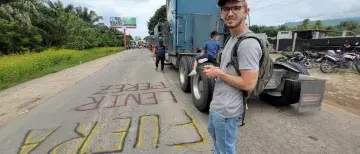
Splitting his time between Mexico City and Honduras, Olson has built a career documenting the human cost of the “war on drugs.”
“My reporting, focused on Mexico and Honduras, has centered on documenting the ‘war on drugs’ in Latin America, the repression of migrants, the ties between governments and organized crime, as well as the repression of land and water defenders fighting against transnational mining and agribusiness interests,” Olson said. “My work has been published in The Intercept, The Nation, Al Jazeera, Foreign Policy, The New Republic, and The Baffler, and has been featured on BBC and NPR.”
Olson’s journey is a powerful reminder that passion can become purpose. His advice to aspiring journalists is simple but profound: be a self-starter. Don’t wait for the perfect job to begin creating meaningful work. Whether through a blog, Substack, or personal website, he encourages students to build a portfolio by focusing on a subject they care deeply about and reporting on it at the local level. This approach, he notes, not only hones your craft but also demonstrates the confidence and initiative that set you apart. “Editors don’t care who has good grammar; that’s what they’re there for,” Olson said. “They want reporters who can creatively think of and get stories.”
Olson also credits Flagler for playing an essential role in his success. He points to the support of his professors for nurturing his intellectual curiosity, even when it took him beyond traditional coursework. With their guidance and encouragement, he secured grants from the Pulitzer Center and Flagler that helped fund his early reporting in Latin America. He gives special thanks to mentors Professor Brian Thompson, Dr. Rachel Cremona, and Professor Tracey Eaton (retired) for their unwavering belief in his potential.
Jared’s story is a testament to the enduring value of a Flagler education, the importance of mentorship, and the power of pursuing your passions.



